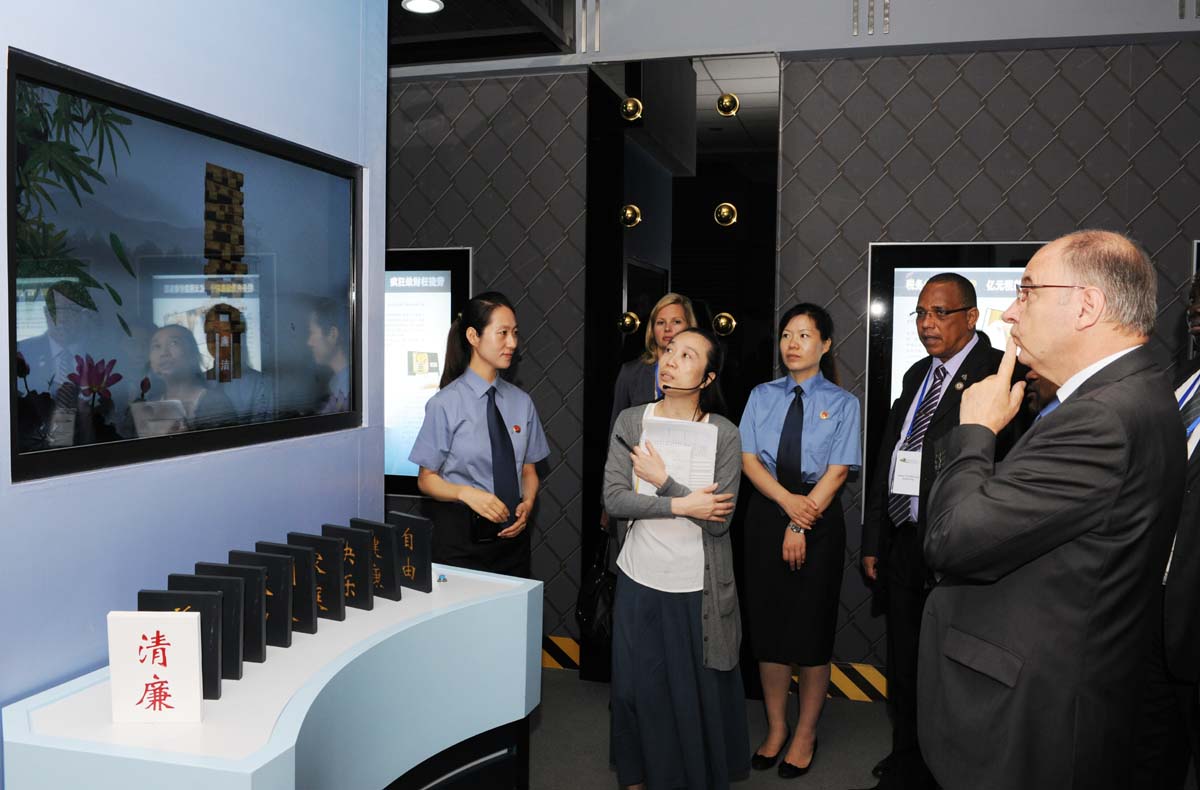Academic exchanges promote clean government research

Over 50 members of the International Association of Anti-Corruption Authorities (IAACA) from 21 countries visit Beijing Municipal People’s Procuratorate on June 17, 2014. IAACA, initiated by China in 2006, aims at guaranteeing the implementation of The United Nations Convention Against Corruption.
The China-Europe High-Level Think Tank Forum on Clean Government was held in Beijing on Sept. 10. The forum focused on topics including the establishment of anti-corruption institutions and mechanisms, new trends in anti-corruption campaigns, anti-corruption think tanks and international cooperation.
Wang Weiguang, president of the Chinese Academy of Social Sciences (CASS) and honorary chairman of the Clean Government Studies Center at CASS, said in a speech for the forum that corruption is a social and historical phenomenon that does not yet have any good solution. The internationalization of social and economic lives has led to cross-boundary corrupt actions and anti-corruption campaigns. It has become a common goal and urgent task for the world to cope with challenges brought up by corruption and prevent its spread.
Since the launch of The United Nations Convention Against Corruption in 2003, many countries in the world have exerted efforts to combat corruption, said Li Qiufang, a member of the Central Commission for Discipline Inspection of the Communist Party of China and the first chairman of the Clean Government Studies Center.
After Putin was inaugurated as the President of the Russian Federation, the government strengthened efforts to combat corruption. It introduced the Russian Federal Anti-Corruption Law, implemented the measure for property declaration and publicity, and established an international scientific plan for the supervision of corruption.
Since the founding of the European Anti-Fraud Office by the European Union in 1999, it has committed to investigating fraud against the EU budget, corruption and serious misconduct within the European institutions.
In Asia, corruption in Indonesia, Malaysia, India, Vietnam and other emerging countries is reducing, which, scholars believe, is the result of effective anti-corruption measures taken by governments. In contrast, in other countries, sluggish growth and corruption merged together. Two reasons have been identified by scholars. The first is that the high-ranking officials lack the aspiration for development, and social equity and justice cannot be guaranteed. The second is the lack of strong political reforms, because political reforms and construction of effective systems are necessities for overcoming the peak periods of corruption.
China has adopted an open mind to participate in international exchanges and cooperation with other countries. In recent years, Chinese authorities have held a zero-tolerance attitude toward corruption, vowing to eliminate corruption at all levels. It also demanded officials abide by the “eight-point” anti-bureaucracy and anti-formalism rules. It implemented an operation called Sky Net to capture corrupt officials who have fled abroad. These measures for curbing against corruption have achieved remarkable success and won global attention.
China’s non-official think tanks are now emerging, serving as a supplement to official think tanks. Ren Jianming, executive director of the Institute of China Supervision, said that over 130 Chinese universities have set up research institutions for research on building a clean government, which are core members of the institute.
Participants from other countries expressed their willingness to cooperate with Chinese think tanks to do research on clean government to build a network of research and cooperation internationally. “We hope to further strengthen our cooperation and exchange with research institutions in China in fields like public resource/public finance management, supervision/competition policy, construction of a clean administration in public sectors,” said Hai Bo, Senior Policy Adviser for China at the Organization for Economic Co-operation and Development (OECD).
In this sense, the forum is not an end but a start.
The forum was organized by the Clean Government Studies Center, Bureau of International Cooperation and the Institute of Sociology, all under CASS. It gathered over 50 scholars and experts from think tanks at the state level and international organizations from China, Russia, Finland, the European Union, and the OECD.
Deng Zhimei is a reporter at the Chinese Social Sciences Today.
